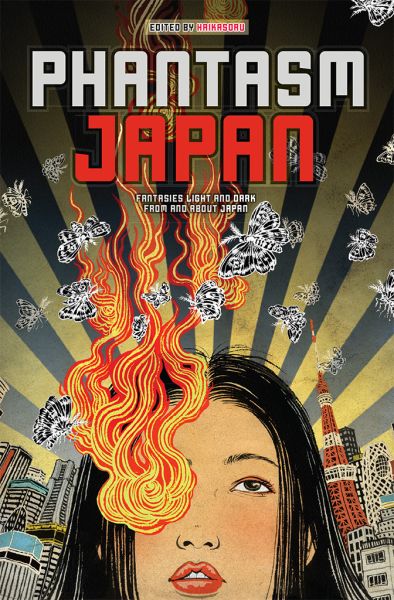fantasies light and dark, from and about Japan
Phantasm Japan:
Edited by Nick Mamatas & Masumi Washington

1 Oct, 2014
0 comments
For some reason the cover says this was edited by “Haikasoru” but that is a stand-in for Nick Mamatas and Masumi Washington. As explained in Mamatas’ introduction, the intention here is de-exoticize so if you’re looking for something to reinforce an impression of Japan as Other and Enchantedly Unknowable, look to other works for support in that endeavor.
Washington for her part makes a point of thanking the translators; they often go unnoticed (and I think in at least one book I am considering for review, uncredited) but anyone who has read a bad translation next to a superior one will know how crucial they are. Lesser publishers could learn from Haikasoru.
Normally I would pick out a few stories of particular note but the anthology is of a consistent quality and it would be much easier to list the few stories that didn’t really hold my interest. I am not going to do that because I think the authors will have a lot more fun speculating amongst themselves which of their efforts I did not care for. It’s more than one! But nowhere near half. And although some of this is very dark, none of it is a waste of time; unlike a certain annual tome misleadingly including the word “Best”, at no point did I yearn for the sweet release of death to free me from reading this work. Even the worst of this was actually pretty good.
Like 2012’s The Future is Japanese, Phantasm Japan features both Japanese and Western authors and while the settings are usually somewhere in Japan, there are exceptions; Project Itoh’s1 characteristically gloomy exploration of consciousness as experienced by Britain’s most famous reincarnating spy, “From the Nothing, With Love”, is set in the United Kingdom.
The editors use a similar strategy for their subject matter; the subtitle says “fantasies light and dark from and about Japan” but they use fantasy in its inclusive sense, including its junior sibling science fiction. There’s nothing wrong with that – poor SF needs all the help it can get – but if you go into this expecting an experience composed exclusively of encounters with strangely considerate souls of the damned, the fury of supernatural lovers and cynical rejection of enlightenment on a cold mountainside, then you may be a little surprised when energy beings from the sun reach out to the inhabitants of Earth or when you find yourself deep in an intimate exploration of mycology.
Links where you can purchase this anthology can be found here, as can biographies of the authors. If you explore around a little, you can find all of Haikasoru’s fiction to date. I can recommend most of it.
Afterword: My choice of this anthology is self-serving in two ways. First, a recurring problem I have with my reviews over all but especially with translated science fiction is for men to predominate. I prefer my reviews to be divided as evenly as possible between men and women and while the twenty-one pieces in this are divided twelve to nine in favour of men, that’s a lot close to 50:50 than most of my translated works (and given how short the Zachary Mason parables are, the word count may be close to even, although “Sisyphean” is pretty long). The other reason is this is the first time I get to try out the anthology-related templates on James Davis Nicoll, and yes, sometimes the reasons behind what I choose to read are just that shallow.
Sorry about lifting the review title from the book’s subtitle.
- I don’t know how many works of the late Project Itoh are as yet unpublished but I would be willing to lay odds not even one of them is a light-hearted comedy.
